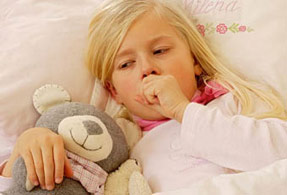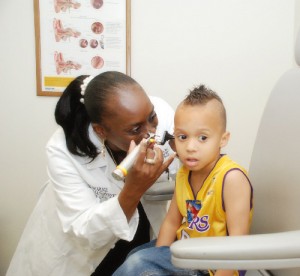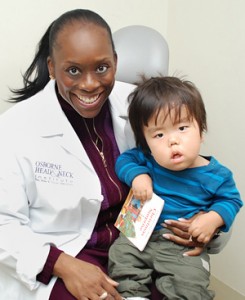- New Sublingual Allergy Tablets - October 31, 2014
- Ground-breaking New Treatment Option for Sleep Apnea - September 27, 2014
- Allergies versus Viruses in Children - September 27, 2014
- “Dog Dust” Protects Children from Allergies - September 27, 2014
- Nasal Saline Irrigation - August 8, 2014
- Doctor, I am Allergic to Dust. What Can I do? - July 31, 2014
- Infants Exposed to Dust Mites Less Likely to Develop Allergies - June 23, 2014
- How to Treat a Young Child’s Cough - December 17, 2013
- Many Parents are Unaware That Their Children Are at Risk for Noise Induced Hearing Loss - December 9, 2013
- Is it a Cold or an Ear Infection? - December 9, 2013
 Question: Doctor my 1 year old daughter has a cough that is keeping her up at night. I went to the store to try to find her something to help her but all of the over the counter cough medications say they are for children 4 years and older. Is there anything that I can give my daughter to help her?
Question: Doctor my 1 year old daughter has a cough that is keeping her up at night. I went to the store to try to find her something to help her but all of the over the counter cough medications say they are for children 4 years and older. Is there anything that I can give my daughter to help her?
Discussion:
Unfortunately, there are not many cough medications available for young children under the age of 4. It is important to recognize that a cough is usually a symptom of another problem. Once the underlying cause has been identified and treated, the cough will resolve on its own.
Most often, a cough is associated with a “cold.” A cold, or upper respiratory infection, is caused by a virus, which is a microscopic organism that is passed from one person to another. A virus can be spread by sneezing, coughing, or by touching a surface, such as a doorknob, that has been contaminated by respiratory droplets. Viruses can actually survive for more than a week on such surfaces. Children who are in daycare or who have siblings in school are at an increased risk for contracting viral illnesses.
 Typical symptoms of a cold include:
Typical symptoms of a cold include:
- Runny nose
- Sneezing
- Low grade fever
- Decreased appetite
- Sore throat
- Cough
- Irritability
Symptoms of a cold usually resolve within 7-10 days, but the cough can last for 2-3 weeks. The concern for most parents is that the cough wakes their child at night. Although the cough sounds bad, it is a protective reflex to clear the airway. Your child should be evaluated by a pediatric ENT if the cough persists for 3 weeks or is associated with difficult or noisy breathing such as wheezing or stridor. Besides a common cold, a cough can be caused by:
- Croup
- Allergies
- Asthma
- Environmental irritants such as tobacco smoke
- Pneumonia
- Sinusitis
- Swallowing or inhaling a foreign body
- Whooping cough
In these cases, treatment of the underlying cause will often help to resolve the cough.
The FDA and American Academy of Pediatrics (AAP) advise against using any type of cough or cold medicine in children under the age of 2 because studies have shown that they are ineffective and increase the risk of life-threatening side effects.
The best treatment for cough in children is supportive care with fluids and rest. Acetaminophen (Tylenol) or ibuprofen (Motrin) can be given for fever. A cool mist humidifier can be used to moisten the air, making it easier and more soothing to breathe. Nasal congestion can be treated with nasal saline and bulb suction or nasal aspiration. Often, when a child lies down to sleep, the nasal secretions can drain from the nose and down the back of the throat, causing the cough. Therefore, treating the nose often helps the cough to resolve.
Antibiotics will only be beneficial if your child has developed a bacterial infection after the virus, such as sinusitis, an ear infection, or strep throat. Antibiotics do not help during the viral phase because antibiotics do not kill viruses. Most often, a cold will resolve on its own.
Signs that should be cause for concern and medical evaluation include:
- Difficult or rapid breathing
- Nasal flaring (flared nostrils when breathing, suggesting difficulty breathing)
- Chest retractions (a sucked-in appearance to the muscles of the chest and neck when breathing in, suggesting difficulty breathing)
- Lips turning blue
- Runny nose lasting over 10-14 days
- Ear pain
- Pus on the tonsils
- Temperature >102
- Excessive sleepiness or crankiness
- Any symptoms in a child less than 3 months of age
Key Points:
- There are not many cough medications available for young children under the age of 4.
- Cough is usually a symptom of a broader underlying problem. Treatment of this problem will usually cause the cough to resolve.
- A cold, or upper respiratory infection, is a common cause of coughing in children.
- The FDA and American Academy of Pediatrics (AAP) advise against using any type of cough or cold medicine in children under the age of 2 because studies have shown that they are ineffective and increase the risk of life-threatening side effects.
- The best treatment for cough in children is supportive care with fluids and rest.



